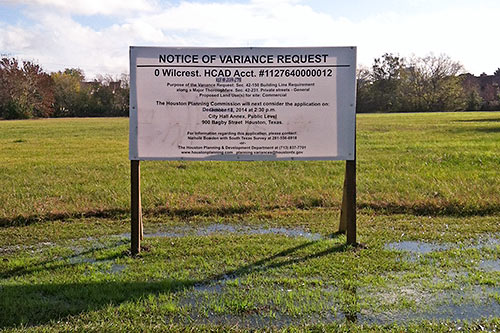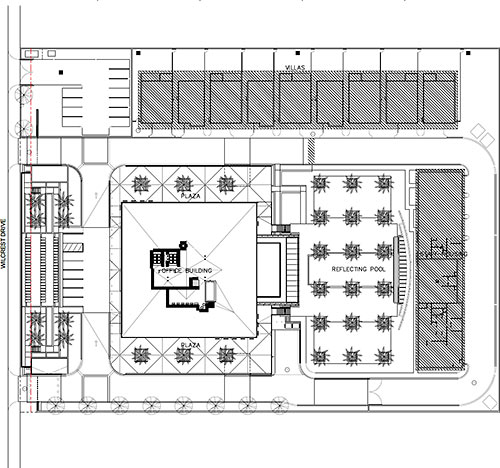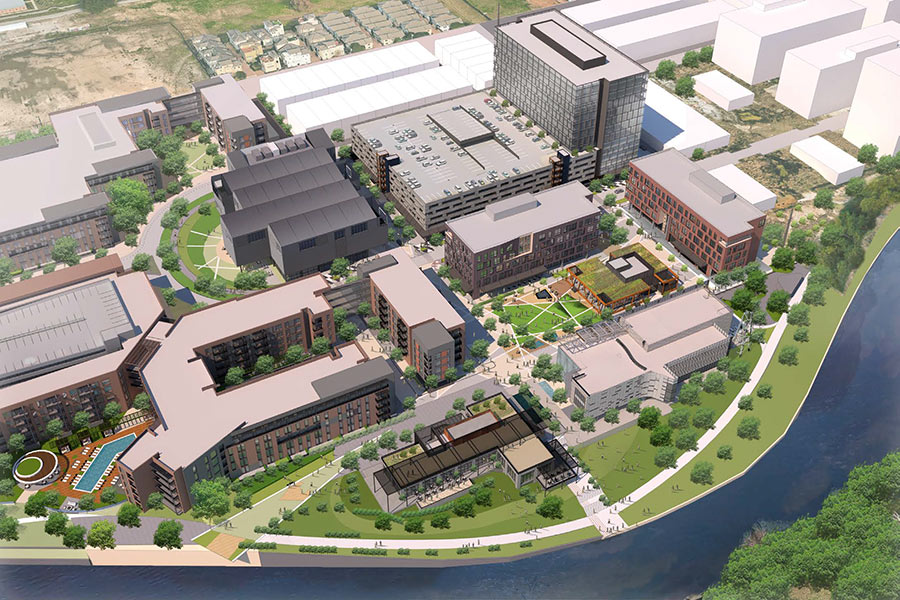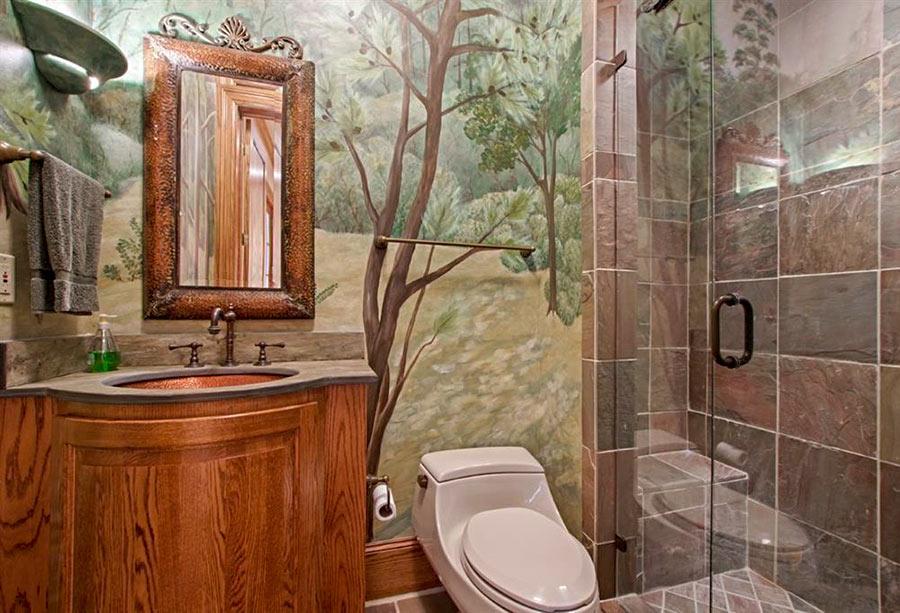
“Does a building have diplomatic immunity to local ordinances if [its site] is deemed international soil?” asks Architect’s Newspaper reporter Jay Thomas, reporting on the variance request made on behalf of a new General Consulate of Saudi Arabia complex in Westchase — which Houston’s planning commission denied in December. The applicants for the variance appear to say yes, it does: “The Consulate should be considered foreign soil and should be allowed to develop the property as they have planned as long as it doesn’t harm the public in any way,” reads the application.
But the design team went ahead and applied for the variance anyway. Why?
***
“We recognize that while we are asking to be considered foreign soil, the development will also need to access city utilities,” reads the application, explaining why an earlier request for a 5-ft. setback for the 2.5-acre complex’s frontage along Wilcrest Dr. between Richmond Ave and Meadowglen Ln. had been relaxed to a request for a 10-ft. setback — and gained approval from the Westchase management district.
The plan by Studio Red Architects submitted with the application (below) shows 2 guard houses in front of the required 25-ft. setback along Wilcrest. The consulate office building itself is sited 40 ft. back from the property line; the complex also includes sites for several residential structures, dubbed villas in the plans and “temporary housing units” in the application.

“The guard houses will keep the general public from accessing the property, preventing incidents. Security for the Consulate is extremely important,” the application continues. “We believe this request is reasonable and just.”
A representative of the planning department tells Swamplot it isn’t clear whether the applicants intend to abide by the commission’s denial — for example, by moving the guard houses deeper into the site — or to submit plans for a different scheme.
- Line in the Plan [The Architect’s Newspaper]
Photo: The Architect’s Newspaper/Jay Thomas. Site plan: Studio Red Architects





This is one of those cases where the law and the politics give two different answers. From a strictly legal standpoint, the Consulate could probably build the guard towers, and say “kiss off” to the City, since they don’t really have jurisdiction. But doing so could ignite forceful protests from neighbors and other parties. Unfortunately, a big part of it is that it’s the Saudi consulate and not, say, Canadian or British.
.
Studio Red was right to put the guard towers through the Variance process. I hope things don’t get ugly should the variance be accepted or denied….
I had this happen on a British Consulate office in LA a loooong time ago. Brits basically told code officials to bugger off, citing security and ‘foreign sovereignty’ domain. Quite enjoyable from this architect’s viewpoint.
There is a commercial activity exception to diplomatic immunity. If a foreign country buys land in the US for an embassy, they can be sued if they don’t pay, etc. I think the main problem with the claim of diplomatic immunity in this matter is that the immunity does not extend to non-diplomatic personnel. Unless the Saudis build the complex using consulate officials, the local contractors will have to abide by City code, stop work orders, etc. But I am sure some developers are watching closely and wondering whether they should include a consulate for the Republic of Djibouti in there next development if they can’t get a setback variance.
A quick call to the appropriate person at the State Department would tell the city how they should proceed. State deals with these kind of issues all the time.
Awesome, I rented my first post-college apartment across the street from there. The Indonesian consulate is on the same block, and the Venezuelan consulate’s less than a mile away, so I guess there goes (?comes?) the neighborhood.
.
From an engineering perspective, this variance request should really be granted. http://www.stratfor.com/ et al have published a few articles detailing how high security facilities are designed; I’m sure the DoD has a more authoritative engineering manual, but I’m not privy to that info. The answer is set the most secure building back by the blast radius of the largest anticipated threat, which is a vehicle-born IED. The fence needs to then be designed to stop vehicles, and the gate house is put in-line with the fence. This means that the gate house needs to go as close to the property line as practical; 10′ sounds about right.
.
I find it curious that the variance request was denied. This seems to be a clear exception to the normal set back rules since the compound’s functionality necessitates secure design. Anyway, the consulate really can tell the City to shove off and just build it like they like – but then the city can deny them the ability to connect to City water, sewer, power, and roads. I’m sure that’s not a situation they want, so the Saudis will cave. Even consulates need a certificate of occupancy from the City before getting utilities turned on.
This is a PR disaster. It’s immaterial if the Saudi’s can get their variance, it reflects poorly on them. In a city that’s the Energy
Capital, in a country that protects their interests, in climate that’s hardly pro Islam, it seems unnecessarily provocative and not neighborly. They might should rethink this, just because you can doesn’t mean you should.
The property is currently only dirt owned by a sovereign government. Since a consulate doesn’t yet exist, on the site, assertions about diplomatic immunity are legally irrelevant.
This shtick that the variance should be granted “as long as it doesn’t harm the public in any way” has a problem on the face of it. If they think that there’s a reasonable chance that somebody will try and set off an explosive device then the setback from the city street is that much more important to ensuring public safety. The further from the middle of a public street that a would-be explosion is likely to be set off, the better for Houstonians.
They really should have anticipated this as a potential problem before going hard on the land deal and made it a stipulation that they needed to obtain approval of their variance request prior to closing. Ultimately, if the site isn’t deep enough to accommodate their security preferences and also comply with code, then that’s not a site that they should have bought — and that’s their problem.
Shannon’s post is exactly the kind of politics I’m talking about. Lots of developers and architects scoff at it, but in this world of blogs, comments on news articles, and Twitter, land use politics is as important as land use law. Look at some of the recent fights here in Houston and elsewhere in the US. Ashby High Rise. “Victory Mosque” in Manhattan. Brooklyn Atlantic Yards. Even the Keystone Pipeline.
.
I doubt Studio Red thought these things through in their design. I used to work there myself. I would bring these things up. I was let go in 2007. Post hoc ergo proptor hoc? I still don’t know for sure. Based on this and the grain silo on top of the Alley Theater, SRA’s design work seems to have gone downhill since I was there.
There is no consular exception to deed restrictions. They can build it but if only residential homes are allowed under the deed, legally it can be bulldozed or the Saudis can pay off the other homeowners to modify the deed restrictions. If a structure is built against deed restrictions, the city is obligated to refuse it basic amenities like water and it can refuse permits to the builders who will build at risk to their licenses and bonding. Zoning is all politics but deed restrictions are valid and basically written in stone.
@ Houstonian: Its not my impression that this is a deed restriction issue.